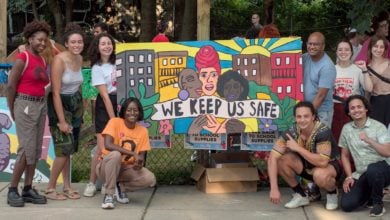In a society where trillions are spent on war, prisons and cops, it is nothing short of criminal to have a single person who does not have the means to provide for her or his basic needs. But criminal is exactly the right word to describe the capitalist system. In the United States poverty affects 46 million people, roughly 15 percent of the population—if you accept the government’s absurdly low poverty line.
If you reject the Department of Health and Human Services’ ridiculous assertion that a family of four can survive on about $22,000 a year, the number rises dramatically. If we take the far more reasonable measure of poverty being defined as a family that will fall below the government’s threshold in the event of an emergency—like a serious illness or layoff—nearly half of households are impoverished.
Like every injustice inherent in the capitalist system, poverty is presented as an inevitable and natural feature of society. The poor live in poverty because of a lack of personal responsibility, the racist and hypocritical right-wing line goes, and they should “pull themselves up by their bootstraps.” On the other hand, liberal and social democratic apologists for capitalism argue that the poor have simply been marginalized. The impoverished, they argue, need to be reincorporated into society through social programs and regulations that will give capitalism a humane character.
In fact, the problem is just the opposite. The poor are suffering precisely because they are part of a social system based on, in the words of Marx, “the accumulation of wealth on one pole” and “the accumulation of misery” on the other. The working poor are fully part of the system. They receive a minimal share of the tremendous wealth they produce and are exploited to the maximum.
The unemployed, the “reserve army of labor,” are also an integral part of this society, kept alive on subsistence levels and incorporated back into the active labor force depending on the needs of capitalist production and the phase of the industrial cycle.
The creation and distribution of wealth under capitalism is a zero-sum game. All goods and services are the product of the collective labor of the working class, while the capitalist class determines the distribution of those commodities because they control—through mere ownership—the stores, factories, offices, raw materials and so forth that are used in the creation of that wealth. The capitalists attempt to pay the workers as little as possible and pocket the rest. More for the bosses means less for the workers—it really is that simple.
Right-wing economists argue that “a rising tide lifts all boats,” that if an enterprise is profitable, affluence will trickle down to its employees. The core of this argument is that capitalists will feel compelled to pay their workers more if profits increase. But even if net economic growth gives workers more leverage to fight for better pay and conditions, the capitalist class may still be exploiting them at a higher rate than before.
Even though the capitalists try to impoverish as many workers as possible to maximize profits, sometimes in response to mass struggle the capitalist government concedes some poverty-alleviating reforms to protect the capitalist system itself.
While the struggles for these reforms are an important part of building a truly revolutionary movement, there can be no lasting gains while the capitalists control production and the government. Examples of this in the United States include the deficiencies and eventual abandonment of Franklin Roosevelt’s “New Deal” and Lyndon Johnson’s “Great Society.” Internationally, the failure of this approach is illustrated by the wave of austerity ripping through the traditionally social democratic countries of Europe.
The socialist solution
A socialist society eliminates the unjust relationship between labor and capital that gives rise to poverty. By taking away the capitalists’ right to exploit labor, the working class is free to decide how the fruits of our labor are used. Needless to say, under this system no one will go without the basic necessities of life.
This is accomplished through a planned economy. Rather than being the private property of the capitalist class, everything involved in the production of wealth belongs to all of society. Through a process of democratic decision-making and consultation with the mass organizations of the people, a plan for the creation and allocation of wealth will be drawn up to provide everyone with health care, education, housing, a job and everything else necessary for a life with dignity.
Even though there is currently more than enough to provide for all members of society, by freeing the vast creative potential of humanity from the crushing alienation and oppression of capitalism, the capacity of a socialist economy to meet people’s needs while protecting the environment will grow enormously. Free education from pre-school through university will allow technological innovation to flourish.
This is not some utopian vision—planned, socialist economies have used their resources to tackle poverty, despite the vicious aggression of the imperialist powers of the world. After the Russian Revolution, the new Soviet government guaranteed employment to all workers and set up a comprehensive network of social security and social services that effectively eliminated poverty.
Between 1950 and 1975, per capita consumption in the Soviet Union increased at nearly twice the rate of the United States—meaning that after only a few decades of socialist development the citizens of the USSR were gaining access to goods and services at a much faster pace than the most advanced capitalist country in the world.
Despite the devastating U.S.-imposed blockade and a centuries-old history of colonization and underdevelopment, socialist Cuba has used its available resources to address the needs of the population. While outrageous medical expenses are a major contributor to poverty in the United States, all Cubans receive completely free health care and enjoy high life expectancies coupled with very low infant and maternal mortality rates.
The people of Cuba, the Soviet Union and other socialist countries were able to eliminate poverty because they organized and struggled—not just for reforms to the existing system but for revolution.
Poor and working people in the United States could eliminate poverty once and for all and usher in an era of peace, equality and abundance. To do this, we need to fight for socialism.






